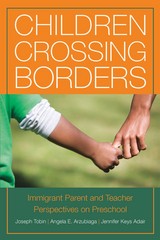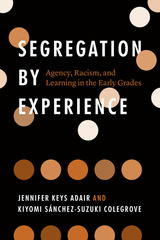2 books about Adair, Jennifer Keys

Children Crossing Borders
Immigrant Parent and Teacher Perspectives on Preschool for Children of Immigrants
Joseph Tobin
Russell Sage Foundation, 2013
In many school districts in America, the majority of students in preschools are children of recent immigrants. For both immigrant families and educators, the changing composition of preschool classes presents new and sometimes divisive questions about educational instruction, cultural norms and academic priorities. Drawing from an innovative study of preschools across the nation, Children Crossing Borders provides the first systematic comparison of the beliefs and perspectives of immigrant parents and the preschool teachers to whom they entrust their children. Children Crossing Borders presents valuable evidence from the U.S. portion of a landmark five-country study on the intersection of early education and immigration. The volume shows that immigrant parents and early childhood educators often have differing notions of what should happen in preschool. Most immigrant parents want preschool teachers to teach English, prepare their children academically, and help them adjust to life in the United States. Many said it was unrealistic to expect a preschool to play a major role in helping children retain their cultural and religious values. The authors examine the different ways that language and cultural differences prevent immigrant parents and school administrations from working together to achieve educational goals. For their part, many early education teachers who work with immigrant children find themselves caught between two core beliefs: on one hand, the desire to be culturally sensitive and responsive to parents, and on the other hand adhering to their core professional codes of best practice. While immigrant parents generally prefer traditional methods of academic instruction, many teachers use play-based curricula that give children opportunities to be creative and construct their own knowledge. Worryingly, most preschool teachers say they have received little to no training in working with immigrant children who are still learning English. For most young children of recent immigrants, preschools are the first and most profound context in which they confront the conflicts between their home culture and the United States. Policymakers and educators, however, are still struggling with how best to serve these children and their parents. Children Crossing Borders provides valuable research on these questions, and on the ways schools can effectively and sensitively incorporate new immigrants into the social fabric.
[more]

Segregation by Experience
Agency, Racism, and Learning in the Early Grades
Jennifer Keys Adair and Kiyomi Sánchez-Suzuki Colegrove
University of Chicago Press, 2021
Early childhood can be a time of rich discovery, a period when educators have an opportunity to harness their students’ fascination to create unique learning opportunities. Some teachers engage with their students’ ideas in ways that make learning collaborative--but not all students have access to these kinds of learning environments.
In Segregation by Experience, the authors filmed and studied a a first-grade classroom led by a Black immigrant teacher who encouraged her diverse group of students to exercise their agency. When the researchers showed the film to other schools, everyone struggled. Educators admired the teacher but didn’t think her practices would work with their own Black and brown students. Parents of color—many of them immigrants—liked many of the practices, but worried that they would compromise their children. And the young children who viewed the film thought that the kids in the film were terrible, loud, and badly behaved; they told the authors that learning was supposed to be quiet, still, and obedient. In Segregation by Experience Jennifer Keys Adair and Kiyomi Sánchez-Suzuki Colegrove show us just how much our expectations of children of color affect what and how they learn at school, and they ask us to consider which children get to have sophisticated, dynamic learning experiences at school and which children are denied such experiences because of our continued racist assumptions about them.
In Segregation by Experience, the authors filmed and studied a a first-grade classroom led by a Black immigrant teacher who encouraged her diverse group of students to exercise their agency. When the researchers showed the film to other schools, everyone struggled. Educators admired the teacher but didn’t think her practices would work with their own Black and brown students. Parents of color—many of them immigrants—liked many of the practices, but worried that they would compromise their children. And the young children who viewed the film thought that the kids in the film were terrible, loud, and badly behaved; they told the authors that learning was supposed to be quiet, still, and obedient. In Segregation by Experience Jennifer Keys Adair and Kiyomi Sánchez-Suzuki Colegrove show us just how much our expectations of children of color affect what and how they learn at school, and they ask us to consider which children get to have sophisticated, dynamic learning experiences at school and which children are denied such experiences because of our continued racist assumptions about them.
[more]
READERS
Browse our collection.
PUBLISHERS
See BiblioVault's publisher services.
STUDENT SERVICES
Files for college accessibility offices.
UChicago Accessibility Resources
home | accessibility | search | about | contact us
BiblioVault ® 2001 - 2024
The University of Chicago Press









